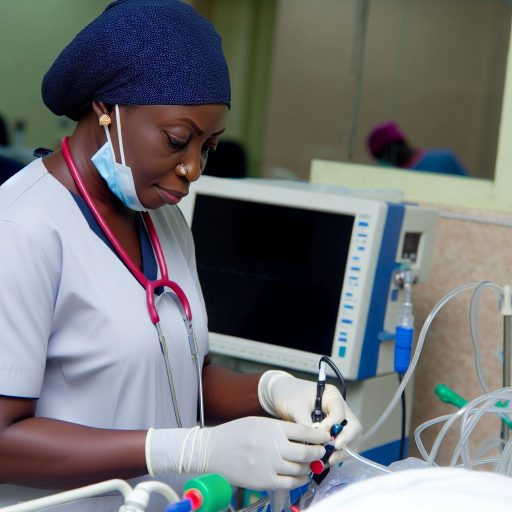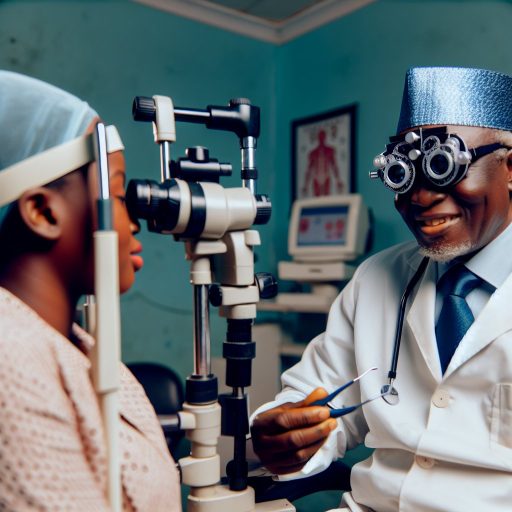Introduction
Biomedical technology involves the use of technology to improve healthcare outcomes for patients.
Brief explanation of biomedical technology
It encompasses a wide range of tools and techniques used in healthcare settings to diagnose, treat, and monitor medical conditions.
Importance of biomedical technology in healthcare
Biomedical technology plays a crucial role in enhancing the quality of healthcare services provided to patients in Nigeria.
It enables healthcare professionals to accurately diagnose diseases, monitor treatment progress, and improve patient outcomes.
The use of advanced medical equipment and innovative technologies has revolutionized the healthcare industry in Nigeria.
Biomedical technology has increased the efficiency of healthcare delivery, reduced errors, and improved patient safety.
Moreover, it has helped in the early detection of diseases, leading to better treatment outcomes and increased survival rates.
The scope of biomedical technology in Nigeria’s healthcare sector is vast and continues to expand.
It is essential for improving the overall quality of healthcare services and enhancing patient well-being.
Current state of biomedical technology in Nigeria
In Nigeria, biomedical technology plays a crucial role in the healthcare sector.
It helps improve diagnosis, treatment, and patient care.
However, the country still faces challenges in fully implementing advanced biomedical technology to its full potential.
Overview of existing biomedical technology in Nigeria
- Medical Imaging: Nigeria has made significant progress in the use of medical imaging technologies such as X-rays, CT scans, and MRI machines to diagnose various medical conditions.
- Laboratory Equipment: Nigerian healthcare facilities are equipped with a range of laboratory equipment for conducting tests and analyzing samples.
- Telemedicine: Telemedicine services are becoming more prevalent in Nigeria, allowing patients to consult with healthcare providers remotely.
- Biomedical Devices: There is a growing market for biomedical devices in Nigeria, including devices for monitoring vital signs and managing chronic conditions.
Challenges faced in implementing advanced biomedical technology
- Lack of Infrastructure: Many healthcare facilities in Nigeria lack the infrastructure and resources needed to support advanced biomedical technology.
- Shortage of Skilled Personnel: There is a shortage of trained biomedical engineers, technicians, and healthcare professionals to operate and maintain advanced biomedical equipment.
- Cost: The high cost of acquiring and maintaining advanced biomedical technology is a major barrier for many healthcare facilities in Nigeria.
- Regulatory Barriers: Compliance with regulations and standards for biomedical technology can be challenging in Nigeria, hindering the adoption of new technologies.
- Security Concerns: The security of patient data and the potential for cyber attacks are significant concerns when implementing advanced biomedical technology in Nigeria.
Despite these challenges, the future of biomedical technology in Nigeria looks promising.
With continued investment in infrastructure, training of personnel, and regulatory framework improvements, Nigeria can harness the full potential of advanced biomedical technology.
This will ultimately provide better healthcare services to its population.
Role of Biomedical Technology in Improving Healthcare Outcomes
Biomedical technology plays a crucial role in revolutionizing healthcare delivery in Nigeria by incorporating advanced tools and techniques for better patient outcomes.
Enhancing Diagnosis and Treatment
Utilizing biomedical technology enables healthcare professionals to accurately diagnose various medical conditions.
This leads to informed treatment plans and improved patient care.
From advanced imaging techniques like MRI and CT scans to genetic testing, technology aids in early detection and personalized treatment options.
Successful Implementation of Biomedical Technology
Several healthcare facilities in Nigeria have successfully integrated biomedical technology into their practices to enhance patient care.
An excellent example is the use of telemedicine platforms to provide remote consultations and monitoring for patients in underserved areas.
Additionally, the implementation of electronic health records (EHRs) has streamlined the workflow of healthcare providers.
This results in efficient and coordinated care for patients.
Examples of Improved Healthcare Outcomes
- The implementation of point-of-care testing devices has enabled quick diagnosis and treatment of infectious diseases, leading to better outcomes for patients.
- Robotic surgery systems have allowed for minimally invasive procedures, reducing recovery times and improving surgical outcomes.
- Remote monitoring devices, such as wearable health trackers, have empowered patients to take control of their health and receive timely interventions when needed.
See Related Content: Radiography and Digital Imaging in Nigeria
Training and Education in Biomedical Technology in Nigeria
Biomedical technology is a rapidly evolving field that plays a crucial role in healthcare systems worldwide, including Nigeria.
In order to keep up with the advancements in this field, it is essential for healthcare professionals to undergo continuous training and education.
Overview of Available Programs and Institutions Offering Training in Biomedical Technology
In Nigeria, several institutions offer programs in biomedical technology to equip individuals with the necessary skills and knowledge to work in this specialized field.
Some of the institutions that provide training in biomedical technology include:
- University of Lagos
- Obafemi Awolowo University
- University of Nigeria, Nsukka
- University of Benin
These institutions offer undergraduate and postgraduate programs in biomedical technology, providing students with a solid foundation in biology, chemistry, physics, and engineering principles necessary for success in this field.
Importance of Continuous Education and Training for Healthcare Professionals
Continuous education and training in biomedical technology are essential for healthcare professionals in Nigeria for several reasons:
- Keeping up with advancements: The field of biomedical technology is constantly evolving, with new technologies and techniques being developed regularly. By undergoing continuous education and training, healthcare professionals can stay informed about the latest advancements and incorporate them into their practice.
- Improving patient care: With the rapid advancements in biomedical technology, healthcare professionals who undergo continuous education and training can provide better and more effective care to their patients. This can lead to improved patient outcomes and overall healthcare quality in Nigeria.
- Enhancing career opportunities: Healthcare professionals who invest in continuous education and training in biomedical technology can enhance their skills and knowledge, making them more competitive in the job market. This can lead to better job prospects and career advancement opportunities in the healthcare industry.
- Ensuring regulatory compliance: Healthcare facilities in Nigeria are required to adhere to strict regulatory standards to ensure the safety and effectiveness of medical devices and technologies. By undergoing continuous education and training in biomedical technology, healthcare professionals can ensure regulatory compliance and maintain high standards of patient care.
Training and education in biomedical technology play a critical role in the healthcare sector in Nigeria.
By investing in continuous education and training, healthcare professionals can stay abreast of the latest advancements in the field, improve patient care, enhance career opportunities, and ensure regulatory compliance.
Explore Further: Rehabilitation for Spinal Cord Injuries Nigeria
Collaboration between Government, Private Sector, and Academia
In order to advance biomedical technology in healthcare in Nigeria, collaboration between the government, private sector, and academia is crucial.
Each sector brings unique strengths and resources to the table, which can be leveraged to drive innovation and improve healthcare delivery in the country.
Importance of Collaboration in Advancing Biomedical Technology in Healthcare
Collaboration allows for the pooling of expertise, resources, and funding to support research and development efforts in biomedical technology.
By working together, stakeholders can better address the complex challenges and opportunities in the healthcare sector, driving progress and innovation.
Examples of Successful Collaborations in Introducing New Biomedical Technology in Nigeria
- Government-Private Sector Collaboration: The partnership between the Nigerian government and private healthcare companies has led to the successful introduction of telemedicine services in rural areas, improving access to medical care for underserved populations.
- Academia-Industry Collaboration: Academic institutions in Nigeria have collaborated with pharmaceutical companies to conduct clinical trials for new drugs and medical devices, leading to the development of innovative healthcare solutions.
- Private Sector-Academia Partnership: Private healthcare providers have partnered with academic researchers to implement electronic health record systems, enhancing patient data management and improving healthcare outcomes.
These collaborations have demonstrated the potential impact of working together to harness the power of biomedical technology in healthcare.
By fostering partnerships and leveraging the strengths of each sector, Nigeria can continue to make strides in improving healthcare delivery and outcomes for its population.
See Related Content: Career Path in Oral and Maxillofacial Surgery in Nigeria
Transform Your Career with Expert Guidance
Get personalized mentorship consulting that’s tailored to your unique path. Our expert advice is actionable and exclusive.
Get Started
Ethical Dilemmas in Using Advanced Biomedical Technology in Healthcare
One of the main ethical dilemmas in using advanced biomedical technology in healthcare is the issue of patient privacy and confidentiality.
With the use of technologies such as electronic health records and telemedicine, there is a risk of unauthorized access to sensitive patient information.
Another ethical dilemma is the potential for bias and discrimination in the use of biomedical technology.
For example, algorithms used in medical decision-making processes may unintentionally perpetuate bias based on race, gender, or socioeconomic status.
This may lead to unjust outcomes for certain patient populations.
Additionally, there is a concern about the over-reliance on technology in healthcare decision-making.
Healthcare professionals must balance the use of technology with their clinical judgment and expertise.
This balance is essential to ensure that patients receive the best possible care.
Importance of Regulations and Guidelines in Ensuring Ethical Use of Biomedical Technology
Regulations and guidelines are essential in ensuring the ethical use of biomedical technology in Nigeria’s healthcare system.
These regulations help establish standards for the use of technology and provide a framework for healthcare professionals to follow.
Regulations help protect patient rights and promote transparency in the use of biomedical technology.
By adhering to guidelines, healthcare providers can ensure they are using technology in a way that is safe, effective, and ethical.
Furthermore, regulations play a role in holding healthcare organizations and professionals accountable for the ethical use of technology.
By establishing consequences for violations of ethical standards, regulations help maintain the integrity of the healthcare profession.
Ethical considerations are paramount in the use of biomedical technology in Nigeria’s healthcare system.
By addressing ethical dilemmas and following regulations and guidelines, healthcare professionals can ensure technology is used responsibly and ethically.
This approach benefits patients and improves healthcare outcomes.
Learn More: Technological Advancements in Biomedical Tech Nigeria
Implications of Biomedical Technology in Nigeria’s Healthcare System
The scope of biomedical technology in Nigeria’s healthcare system is immense.
It plays a crucial role in diagnosis, treatment, and patient care.
Ultimately, this technology improves healthcare outcomes.
This technology has the potential to revolutionize the healthcare sector in Nigeria.
It enhances efficiency, accuracy, and accessibility of medical services.
As we move forward, it is essential to continue investing in and advancing biomedical technology.
This effort aims to address the healthcare challenges faced by the country.
By prioritizing research, development, and implementation of innovative technologies, we can ensure better healthcare delivery.
These advancements will lead to improved outcomes for all Nigerians.
It is imperative for policymakers, healthcare professionals, and stakeholders to collaborate.
Support initiatives that promote the growth and utilization of biomedical technology in Nigeria.
Together, we can build a stronger, more resilient healthcare system.
This system leverages the power of technology to improve the lives of millions of people in the country.
Let us join hands to make a concerted effort towards harnessing this full potential.
Our goal is the betterment of Nigeria’s healthcare landscape.
Additional Resources
Alvan- Emeka Ukachukwu | Duke Department of Neurosurgery
Recent Advancements in Emerging Technologies for Healthcare …




